I am not sure who was the more surprised when I arrived—me or the rabbits….
So begins Alphonse Daudet’s ‘Lettres de mon moulin/ Letters from my windmill (1869).
The door had been bolted and barred for a long time, and the walls and platform were overgrown with weeds; so, understandably, the rabbits had come to the conclusion that millers were a dying breed. They had found the place much to their liking, and felt fully entitled to make the windmill their general and strategic headquarters. The night I moved in, I tell you, there were over twenty of them, sprawled around the apron, basking in the moonlight. When I opened a window, the whole encampment scampered off, their white scuts bobbing up and down until they had completely disappeared into the brush. I do hope they come back, though.
I have no windmill in Provence, but I do have strip of land, a káposztás kert, a cabbage garden in the Balaton Uplands. In England, you would call it an allotment, a strip of soil on the edge of the village, alongside what were once a dozen such strips.
Mine in the middle, Fritzi’s on the left, Karcsi’s on the right, looking downhill, June 2020
The trouble was, when we bought it a decade or so ago, it was as overgrown as Alphonse Daudet’s mill, with nearly as many rabbits, and some roe deer and wild boar to boot.
It’s on a gentle slope, and is blessed with a stream running through the middle, and a magnificent willow on the shore of the stream. There’s a rundown shed with a corrugated iron roof and a strong smell of mice, under the tree, where I store my hoe, garden fork, scythe and pitchfork.
Lower garden, June 2021
Above the stream my garden is 24 metres, below it 44 metres long, and the whole strip is 4.5 metres wide. I knew something good could come of it, because both my diligent neighbours, Fritzi on one side and Karcsi on the other, produce a handsome crop of potatoes, onions, zucchini, paprika, squash, sorrel and raspberries each year from their own patches.
Karcsi listens to Retro radio. The stupid prattle of the presenters is unbearable, and the hourly ‘news’ bulletins even worse, we both agree, (government propaganda) but all those 1980s hits keep him company while he hoes, so I can’t complain. We talk about the weather mostly, and the hope of rain. There’s often a gusty, south-westerly wind. ‘The Somogyi rain’ they call it, he explained once.
Somogy is a county in SW Hungary, once notorious for its lack of rain.
Fritzi used to grow vegetables the length and breadth of his patch, but now he’s planted fruit trees on the lower section, to spare his back. He’s in his mid-70s, and is slowing a bit. He’s rightfully proud of his blackberries. He bought ducks to eat the slugs, but the ducks ran off, so now he keeps them in their private enclosure, in his other garden, and collects the slugs by hand, to feed them. This year, though, there are no slugs - but I’ll get to that later.
Willow wand in Spring
There were once at least a dozen gardens here, but only about six of us are still at work. The other gardeners retreated to the village, or went to join the Great Gardener in the sky. Their plots have disappeared beneath the weeds, as mine nearly did.
The weeds in my garden come in all shapes and sizes, but the most persistent, and the hardest to remove, is the couch grass (Elymus repens).
From its name you would think of it as a lazy sort of weed, prone to lounging on the couch with a beer, watching endless serials, but nothing could be further from the truth. It’s a hard working, wiry sort of fellow, growing day and night. If I was a more patient man, I might cook the rhizomes up as an anti-inflammatory. But as I aspire to be a vegetable gardener, I have declared war on them instead.
Top garden, after scything, May 2021
The couch grass formed a thick pasture, like a homeless man’s hair, over the forehead of my clayey, unprotesting soil. Or a rugged pelt, on the back of a sleeping bear. How to get rid of it? It scythes nicely, in the early morning, damp with dew, but that’s the best that can be said for it. One website I found suggested a powerfully poisonous substance called ‘Roundup’, a widely used glyphosate spray.
You can read why I wouldn’t touch that with a bargepole here and here and here. So when we took the thatch off the roof of our house, in the next village, in the autumn of 2021, I decided to move that thatch to my garden, as a mulch. Instead of removing my weeds laboriously, one by one, I calculated, I would ingeniously dump a heavyweight of old Danube reeds on their heads, rot them down, and deep brown, virgin soil would appear miraculously underneath.
I ordered a lorry-load of mature, year-old manure from the magnificent Hungarian grey cattle of Salföld, and spread that diligently over my whole couchgrass plantation, barrowload by barrowload.
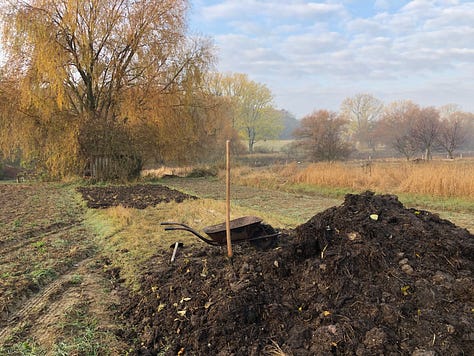
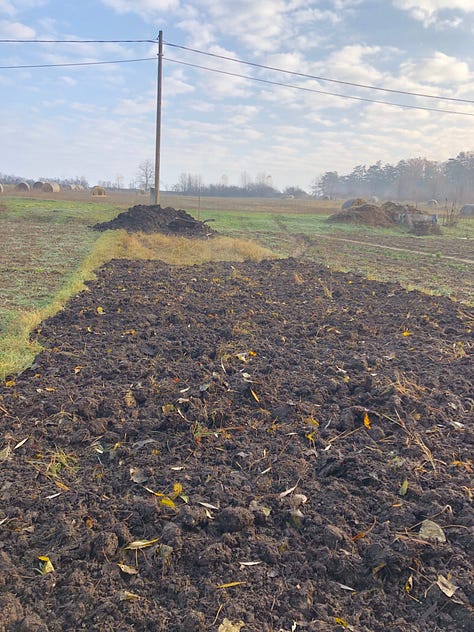
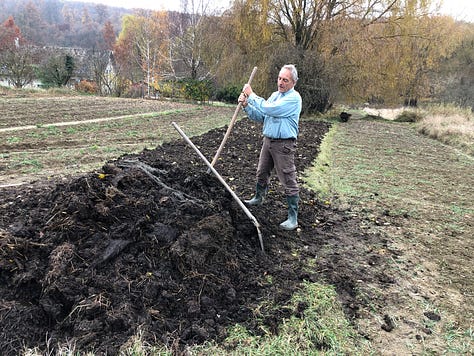
Then I raided the bins next to the market in Balatonfüred, for a good supply of cardboard. This I laid it out, in overlapping segments, over my munificent manure, to cruelly starve the couch grass of daylight.
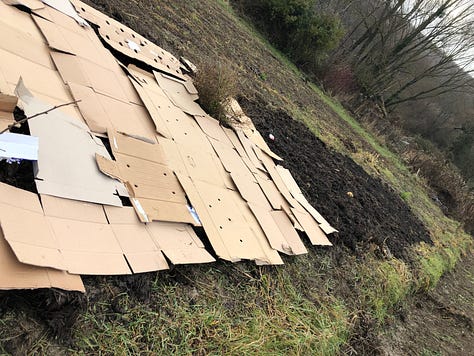
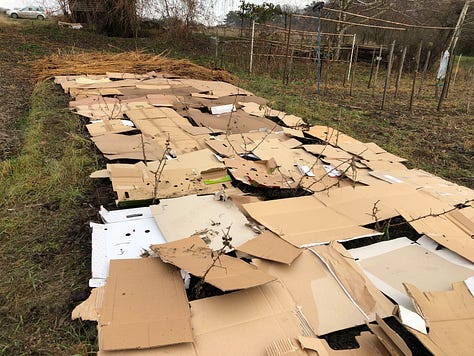
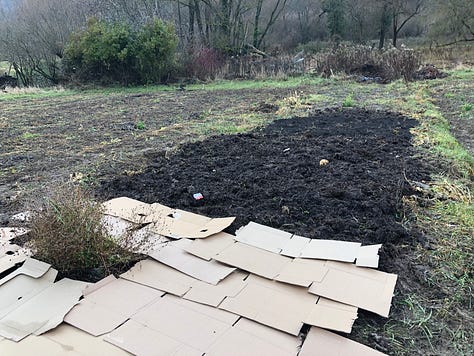
Finally, I asked Gyuri, a local farmer, to dump the thatch at the end of the strip. And for days on end, I pitchforked reeds the length and breadth of my garden, over the layers of cardboard and manure.
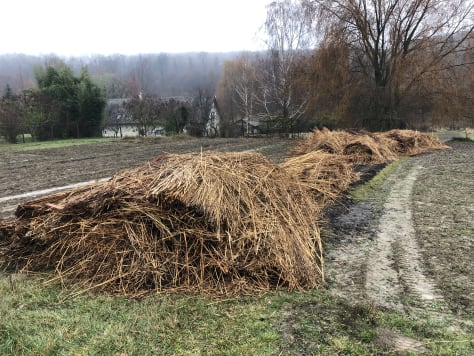
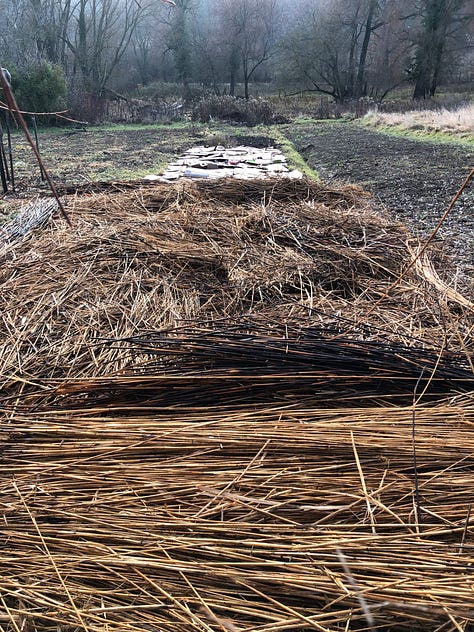
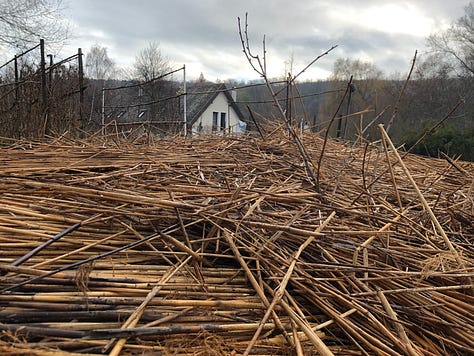
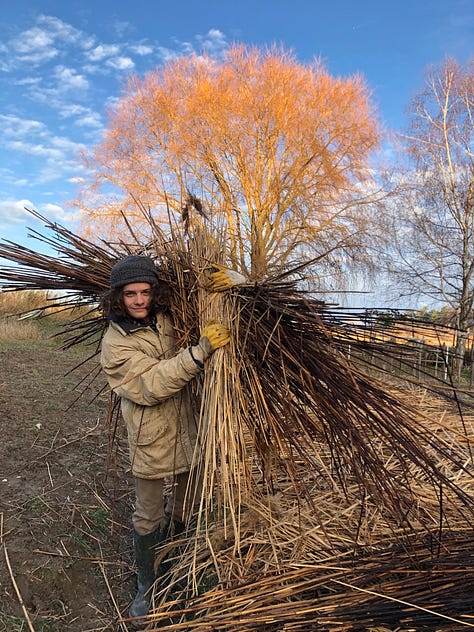
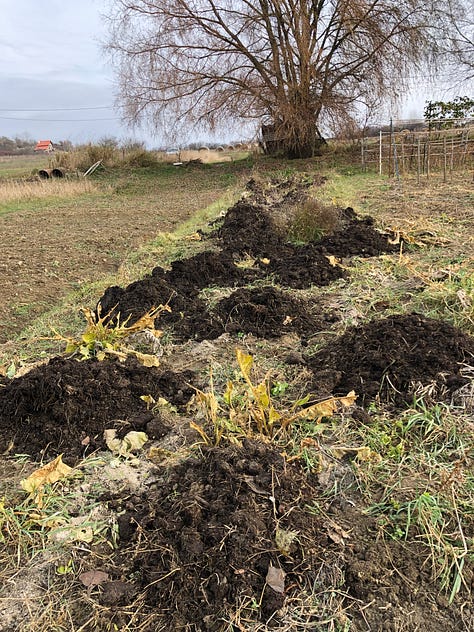
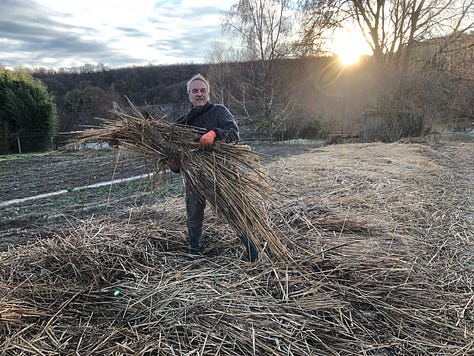
‘The Englishman is crazy…’ they declared in the village. ‘He’s thatching the earth!’
‘Stupid idea…’ said the farmer, ‘that reed will take a decade to rot down.’
‘What do you normally do with old thatch then?’ I asked him, not completely innocently. ‘Well, I’ve got a friend in the local fire brigade…’ he winked. ‘And on the night I burn it, I tell him not to answer any calls, it’s only me…’
Back in my garden, the seasons, then the years passed. My neighbours continued to harvest their excellent crops.
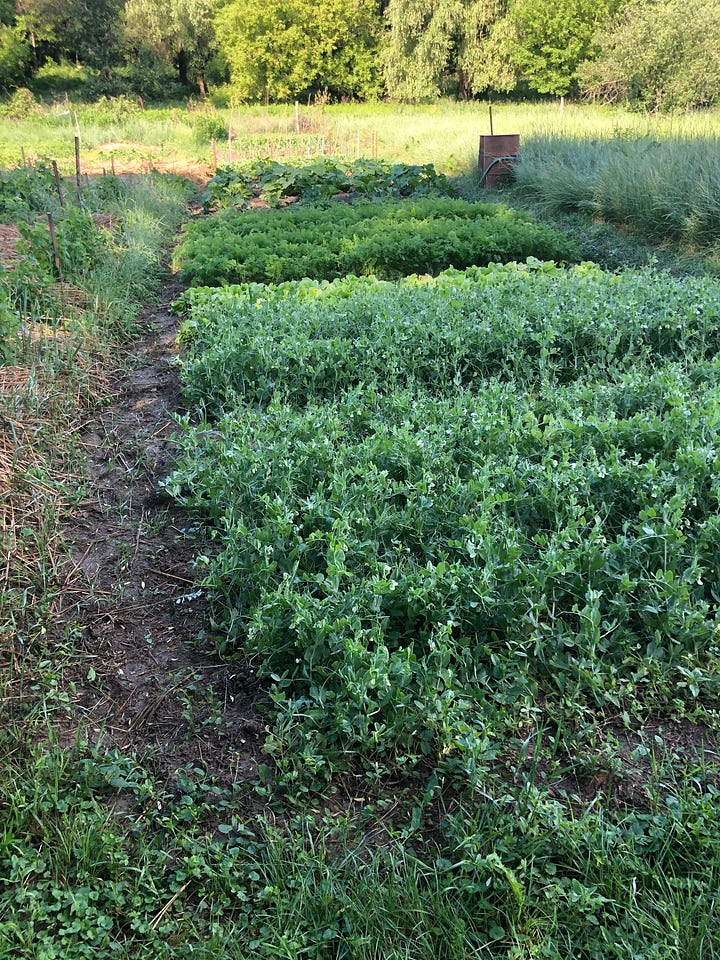
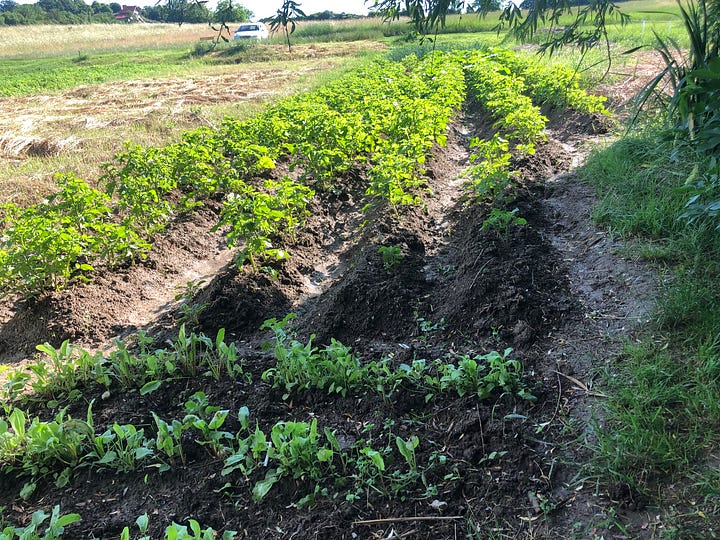
Karci’s peas (l) and potatoes and sorrel (r)
My metre-thick thatched garden went down a bit, then a bit more, and finally something green started to show through. It was the couch grass. Soon I had a new sea of weeds - but this time, spreading on top of the thatch.
Undaunted, I started pulling it up. It came easily, but then I had a better idea. In my old walking boots, bought for Slobodan Milosevic’s funeral in 2006, I discovered that if I kicked the matted thatch, along the whole width of my garden, I could sort of roll it up, like a carpet. And then I could dig the soil beneath. The soil was still riddled with the tell-tale white roots of the couch grass, but also boasted a new treasure - worms! Thousands of the beauties!
There was one other factor in my favour. When the Great Gardener created couch grass, he made its roots or rhizomes white. This means that, when the daylight has nearly gone, and your back is breaking from digging, and only a cup of tea or a tumbler of wine could quench your thirst, you dig another half an hour anyway in the dusk, just to clear another half metre band of soil of those pesky, fluorescent roots. And on nights with a full moon you could almost keep going till dawn…
It took me another year or so to roll up my thatch, and stack it along one edge, next to Fritzi’s new electric fence. In the meantime Karcsi, on the other side, installed an electric fence too, powered by solar panels. I offered to chip in, and extend their fences round my land. But they laughed it off, in that very Hungarian way. Since 1990, it’s been every man for himself in the countryside. 4 decades of forced co-operation killed the co-operative spirit. Anyway, Fritzi and Karcsi explained to the crazy Englishman, I was getting the best possible deal, for free. With electric fences either side of me to keep out the big animals, all I had to do was build a little fence of my own at each end, then all I would have to worry about would be the big orange slugs. And the rabbits. And the stinkbugs.
So I patiently dug the 68 metre length of my garden, piling up all the weeds in small mountains at either end. And I cut bamboo from Józsi’s garden in the village, and wove myself a nice bamboo fence to keep out the big animals.
I bought a few sacks of Alginit, an astonishing, fossilised seaweed full of ancient minerals and the ash of extinct volcanoes, and dug it diligently into the soil. And I spread wood ash from my tiled stove and the open fire in my garden.
Below the stream, I planted blackcurrant stems, red gooseberries, and raspberries, to reduce the amount of vegetable land I would need to hoe in future years. Then I re-spread my older, wiser thatch remains over the soil, and dug that in.
And on the seventh day… (the fourth year after I thatched the earth)… I planted.
The Gardener - by the Tallest Man on Earth
Episode 2 coming soon!


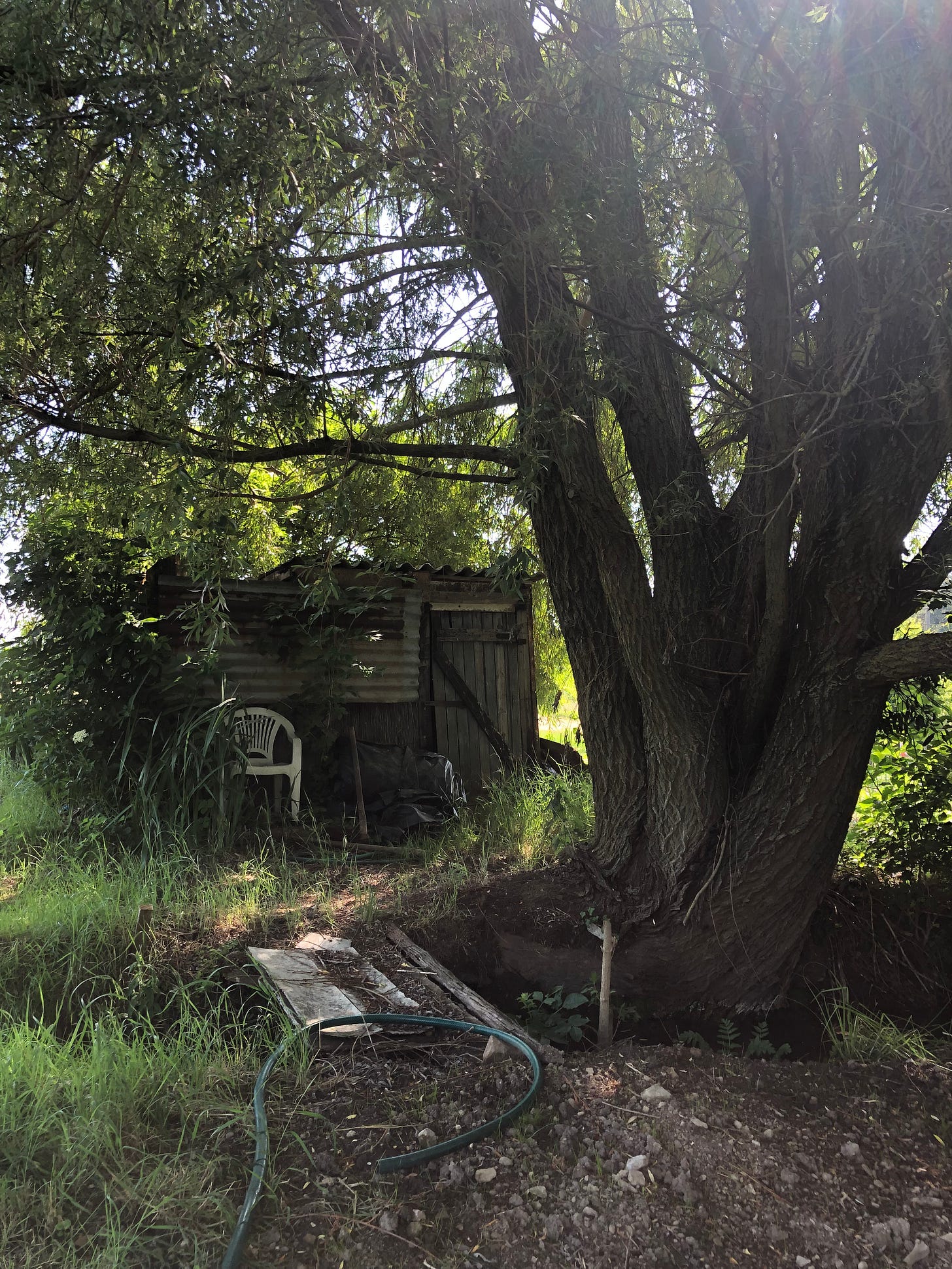
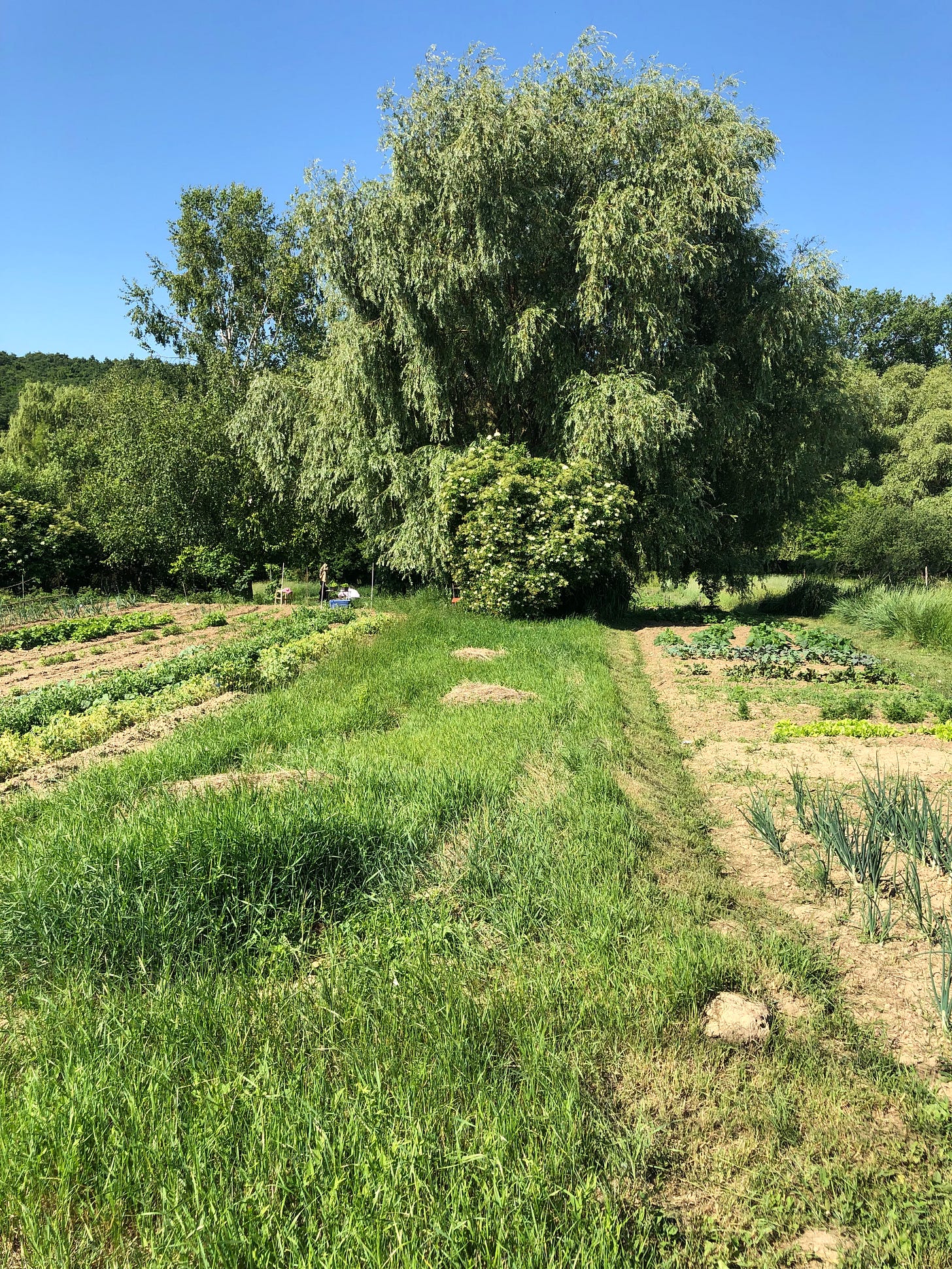
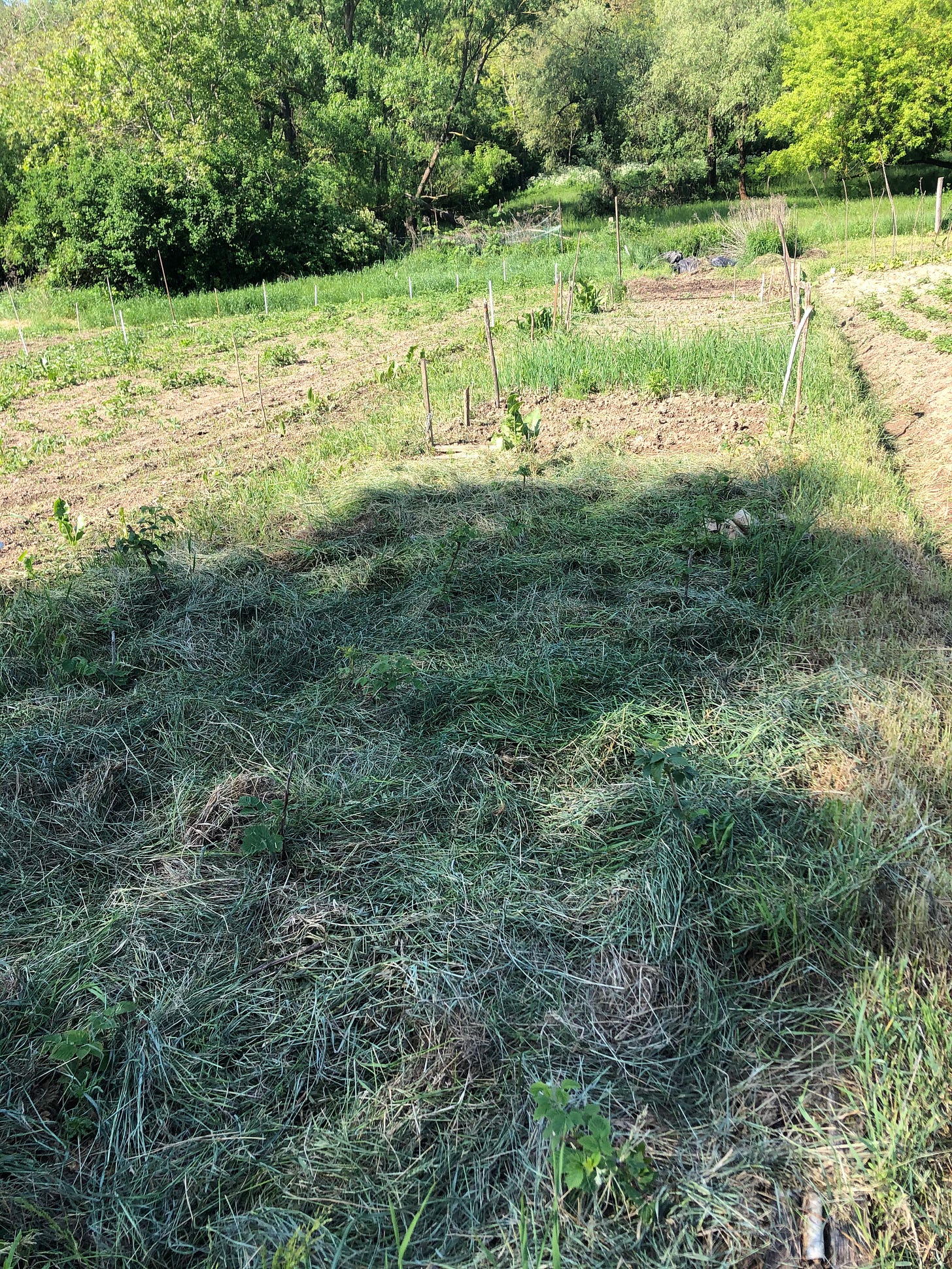
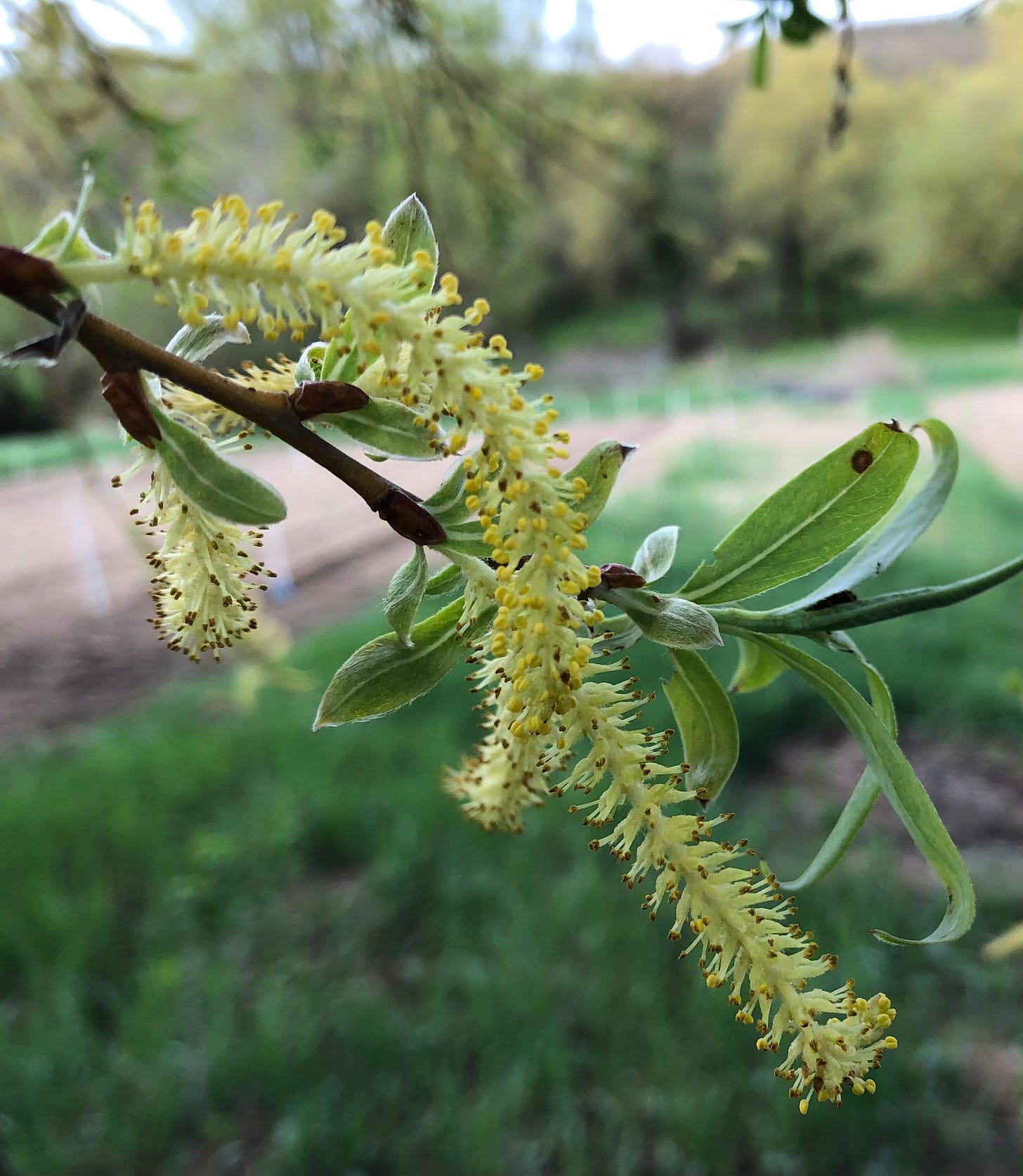
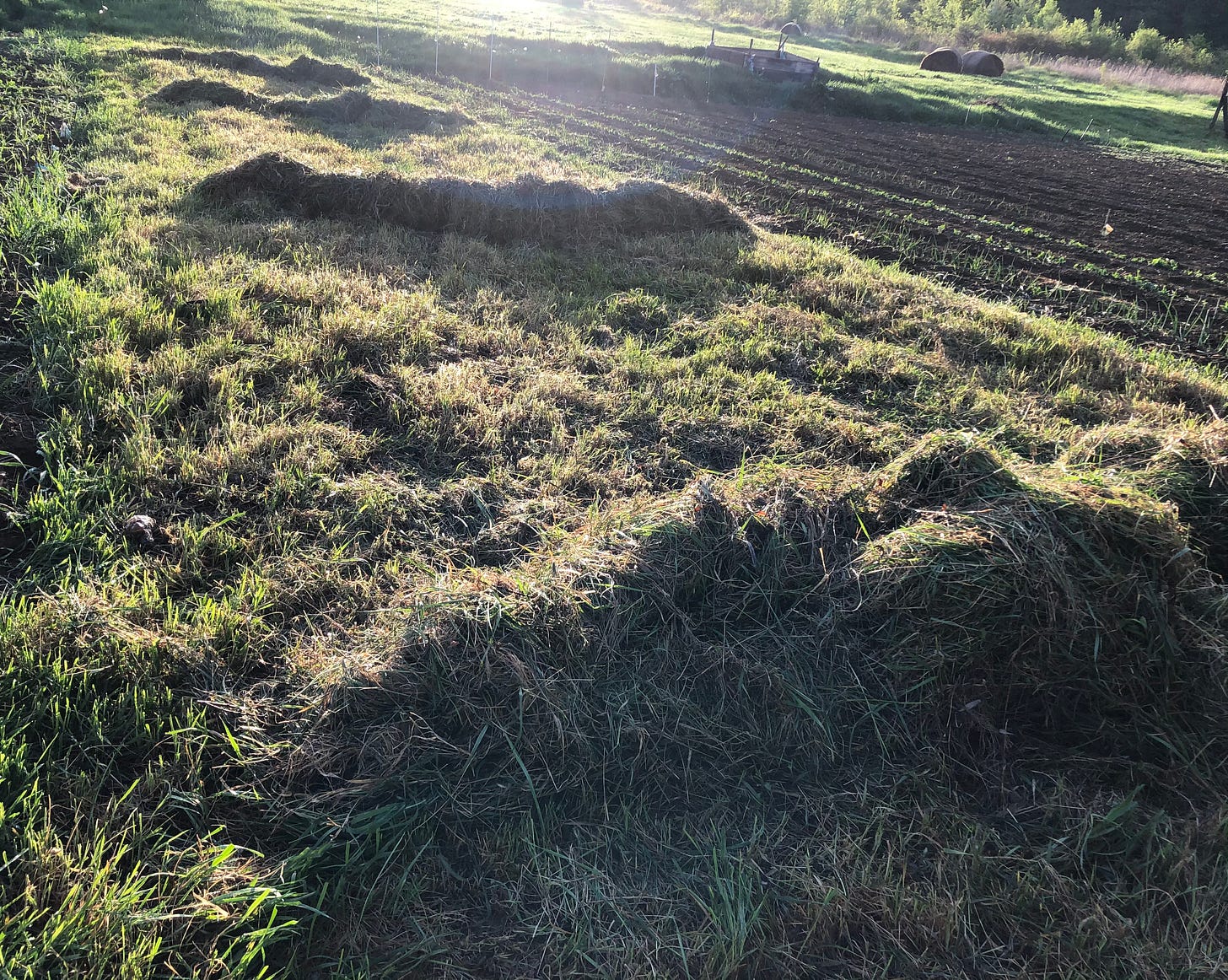
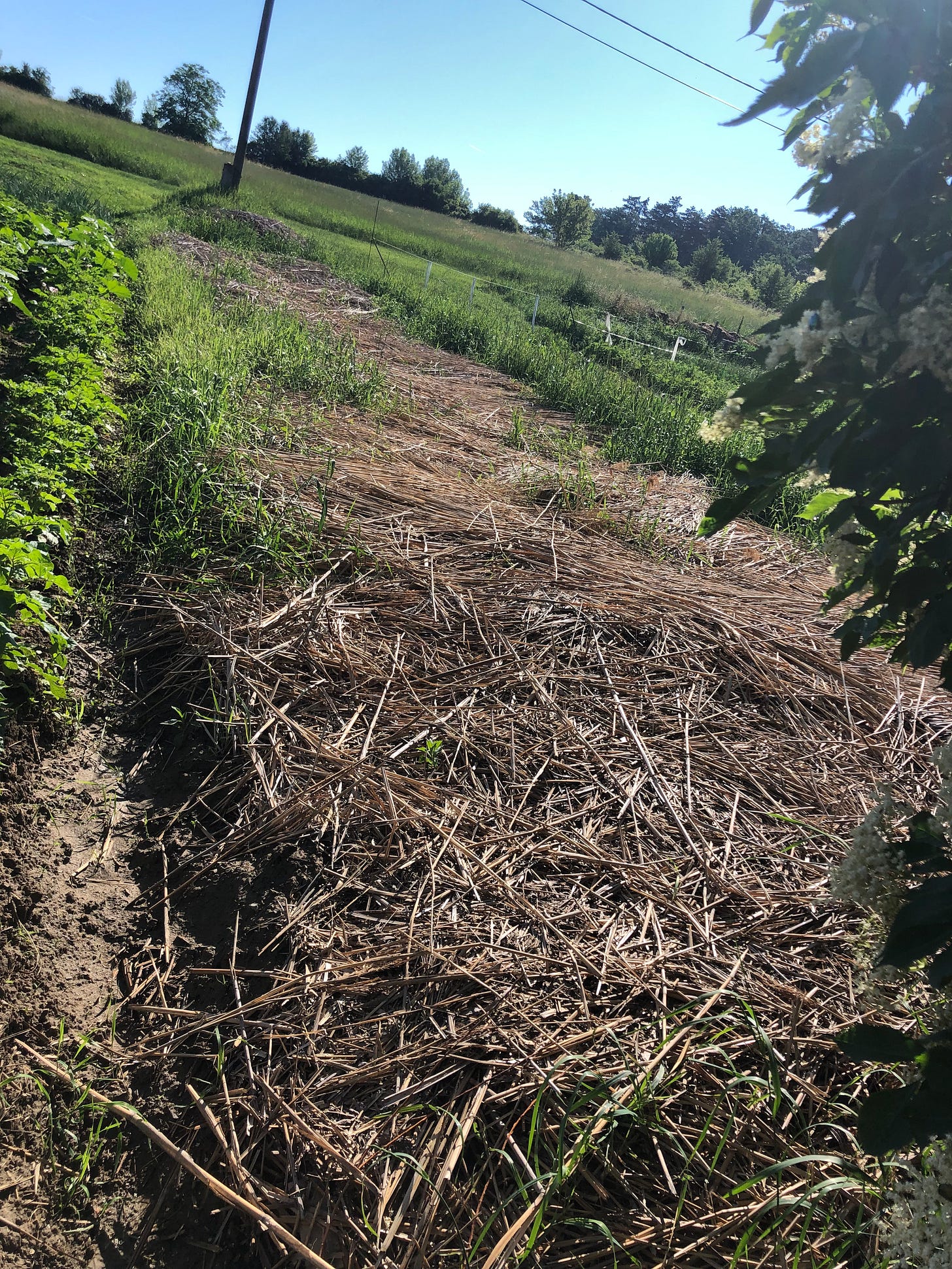
Lovely piece, Nick - glad to see there are others on Earth as crazy as we are in Olympos!
I can relate to this post a lot, being in the same shoes but in Ireland. We are reclaiming a big patch of land overtaken by brambles. No chemicals, only our labour... We are getting there. :)
It would be a really interesting topic how people who are just reconnecting the land by cultivating it get tons of advice (or strange looks :) ) from locals, I am sure all countries have their specifics. If you are a foreigner, it adds another layer...
The first advice told by our Irish neighbours was to bring goats or pigs but we were against it, they would eat everything, not only the brambles. My wife decided to pull out the little monsters one by one, after I slashed them with machete.